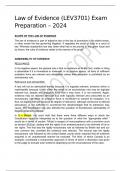Law of Evidence (LEV3701) Exam
Preparation – 2024
SCOPE OF THE LAW OF EVIDENCE
The law of evidence is part of adjective law or the law of procedure in its widest sense,
in other words the law governing litigation. It regulates the proof of facts in a court of
law. Whereas substantive law lays down what has to be proved in any given issue and
by whom, the rules of evidence relate to the manner of its proof.
ADMISSIBILITY OF EVIDENCE
RELEVANCE
In its negative aspect, the general rule is that no evidence as to any fact, matter or thing
is admissible if it is immaterial or irrelevant; in its positive aspect, all facts of sufficient
probative force are relevant and admissible unless their reception is prohibited by an
exclusionary rule.
Relevance and admissibility
A fact will not be admissible merely because it is logically relevant: evidence which is
inadmissible because it falls within the ambit of an exclusionary rule may be logically
relevant but, despite any probative force that it may have, it is not received. Again,
evidence may be rejected although it is both logically relevant and untouched by an
exclusionary rule when its probative force is insufficient to warrant its reception. It is
thus not legally relevant because its degree of relevance, although conducive to rational
persuasion, is not sufficient to countervail the disadvantages that its admission may
cause. The Constitution has also affected the question of discretionary admissibility of
illegally obtained evidence.
In S v Melani, the court held that there were three different ways in which the
Constitution could be interpreted as to the question of what the “appropriate relief ”
would be in terms of section 7(4)(a) in respect of noncompliance with a provision such
as section 25(2)(a), dealing with the rights of an arrested person to be informed of his or
her rights. The first was the rigidly inclusionary rule as followed by British law and our
own common law, provided the evidence was relevant. The second was the rigidly
exclusionary rule followed by the United States courts which required that all evidence
acquired in an unauthorised manner be excluded. The third, of which Canada is an
example, constituted a compromise approach in terms of which a discretion was given
to the judge to exclude such evidence depending on the circumstances of the case.
, In the opinion of the court, the latter offered the best opportunity to find a proper balance
between the legitimate interests of an accused and those of the community at large. It
was therefore decided to admit the evidence, so as not to let the law fall into disrepute
in the eyes of the public, particularly since the events took place before the interim
Constitution had come into force. As the police officer had acted in good faith and in a
manner which would have been justified before the coming into operation of the
Constitution and the relevant non-compliancewith the latter was, in the particular
circumstances of the case, not of a particularly serious nature, the exclusion of the
evidence as to the alleged pointing out would have brought the administration of justice
into discredit and dishonour. The view that relevance and admissibility are distinct
concepts is artificial. To argue that relevancy depends on reasoning, while admissibility
depends on law, would ignore the fact that irrelevant evidence is excluded as a matter
of law. Such a view rests also on the false inarticulate premise that the determination of
relevancy in legal proceedings depends on rational considerations only, that is to say,
on pure logic.
It is true that evidence will be irrelevant if it is incapable of inducing rational persuasion
and that, in this aspect, legal relevance is purely a matter of reason, but to be legally
relevant (in the sense outlined above) evidence has to be sufficiently relevant to warrant
its reception, in the circumstances, despite any disadvantages that may arise from its
admission. Legal relevance is, therefore, a juridical concept that involves both rational
and practical considerations.
Weight and relevance
Questions of the weight and the admissibility of evidence are distinct and should never
be confused. This principle signifies, first, that a fact will not be excluded for irrelevance
simply because it is inconclusive and, second, that the judicial officer has initially to
decide whether evidence materially tends to prove, or disprove, a fact or thing in issue
and whether it is affected by an exclusionary rule. It is only after the judicial officer has
decided that evidence is admissible that he or she (with assessors, if applicable) may
determine its weight, that is to say, the extent to which it fulfils its probative purpose.
This does not derogate from the fact that, to be relevant and admissible, evidence must
have sufficient probative force. Evidence that has no (or very little) weight can have no
probative value and must necessarily be irrelevant. Again, the judicial officer, when
making the initial decision to receive (or not to receive) evidence, has a discretion to
exclude any fact or thing the probative force of which is insufficient to warrant its
reception in the light of the practical difficulties that would arise were it to be admitted.
To say this is not to confuse weight and admissibility; the former comes down to a
further refining of the exact probative value of admitted evidence.
Legal relevance
The word “relevance” does not mean the same thing to the lawyer and the logician. To
the lawyer, relevancy is based on a blend of logic and experience. The law starts with




